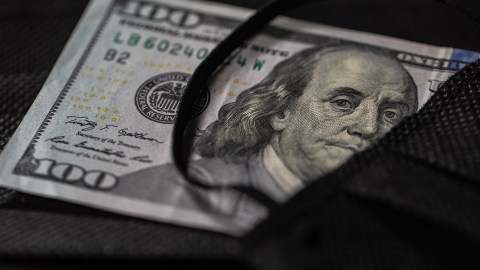Could price gouging during a crisis actually be moral?

- Paper products, hand sanitizer, masks, and cleaning wipes—all are in high demand and short supply during the COVID-19 crisis.
- Price gougers are viewed as villains in this crisis—but two scholars argue that price gouging is, in most cases, morally permissible.
- Increased prices prevent unnecessary hoarding. Buyers purchase only what they need when they need it. Also, producers are incentivized to make more. When the supply rises, prices will fall.
At the Safeway grocery store in Southwest Washington, D.C., the toilet paper and paper towels section has been empty for most of the last two months. When the store does restock, supplies don’t last long on the shelves. “Do you know if they have paper towels?” a pedestrian outside the store asked a stranger exiting the Safeway in late April. The answer was no: “Still out.”
Paper products, hand sanitizer, masks, and cleaning wipes—all are in high demand and short supply during the COVID-19 crisis. Shoppers across the country are facing empty shelves and out-of-stock signs.
But any seller who reacts to current crisis conditions by increasing prices on in-demand products may be committing a crime. Thirty-four states have laws against price gouging. In March, a bipartisan group of state attorneys general wrote a letter urging online marketplaces to crack down on price spikes.
“[W]hile we appreciate reports of the efforts made by platforms and online retailers to crack down on price gouging as the American community faces an unprecedented public health crisis, we are calling on you to do more at a time that requires national unity,” the letter said.
A price gouger makes a good temporary boogeyman. One could look at high prices during an emergency and think: They’re trying to profit off of my desperation.
What exactly is price gouging, and what distinguishes it from a normal price increase? New York Attorney General Letitia James told NPR that “there’s no definitive answer” but “you know it when you see it—[it’s] when individuals are taking advantage of the market, particularly when a neighboring store is selling the same product for much less.” New York’s price gouging complaint form, which consumers can use to report retailers, defines it as “unconscionably excessive pricing of necessary consumer goods and services during any abnormal disruption of the market.” However different states might define it, price gouging is widely understood to be exploitative, sleazy, and heartless. Laws against it are popular.
But Michael Munger, professor of political science at Duke University, says that high prices are a crucial part of dealing with scarcity during an emergency.
“If you use the police to keep prices artificially low, it makes the problem of scarcity much worse,” Munger says in a short Institute for Humane Studies video on price gouging. Price gouging during an emergency allows more people to get what they need as soon as possible. “And that’s true even for those who can’t afford the gouger’s prices,” Munger explains.
How? Increased prices prevent unnecessary hoarding. Buyers purchase only what they need when they need it. Also, producers are incentivized to make more. When the supply rises, prices will fall.
“Price gouging laws keep the shelves empty longer,” Munger says.
Price Gougingwww.youtube.com
Matt Zwolinski, professor of philosophy at the University of San Diego, argues in his paper “The Ethics of Price Gouging” that “most, though not all, cases of price gouging are at least morally permissible, if not morally praise-worthy.”
“Relative to the baseline of no exchange at all, the gouger’s proposal stands to improve the lot of the buyer, not to worsen it,” Zwolinski writes. If a buyer purchases a product at an exceptionally high price during an emergency, the buyer has decided that their emergency need justifies the high price. As Zwolinski puts it: “[W]hile the price of generators might rise dramatically in the wake of a disaster which knocks out power to a certain population, so too does the need people have for generators.” A seller who raises prices did not create the buyer’s increased need; he or she is merely reacting to it.
This doesn’t mean, of course, that the price gouger is motivated by altruism. “[T]he fact that there are good arguments to be made for the moral permissibility of price gouging in certain cases does not mean that those who actually engage in the practice are motivated by these considerations,” Zwolinski writes. But that’s also true of normal market activity: As Adam Smith says in The Wealth of Nations, “It is not from the benevolence of the butcher, the brewer, or the baker that we expect our dinner, but from their regard to their own interest.” A price gouger makes a good temporary boogeyman. One could look at high prices during an emergency and think: They’re trying to profit off of my desperation.
But if we heed the work of scholars like Michael Munger and Matt Zwolinski, we might begin to see price gouging as a rational and necessary part of emergency response. During normal times, a pack of hand sanitizer might cost the same as a bottle of red wine. But right now, during the COVID-19 pandemic, does anyone place nearly the same value on a bottle of wine as on a pack of hand sanitizer? By using the law to forcefully keep prices below what people would pay in an emergency, states enable hoarding. For Americans who would like to buy hand sanitizer—or paper towels, toilet paper, cleaning wipes, or masks—and can’t find any, price gouging laws are a cold comfort. Most would rather have the option of paying increased prices than no options at all.





